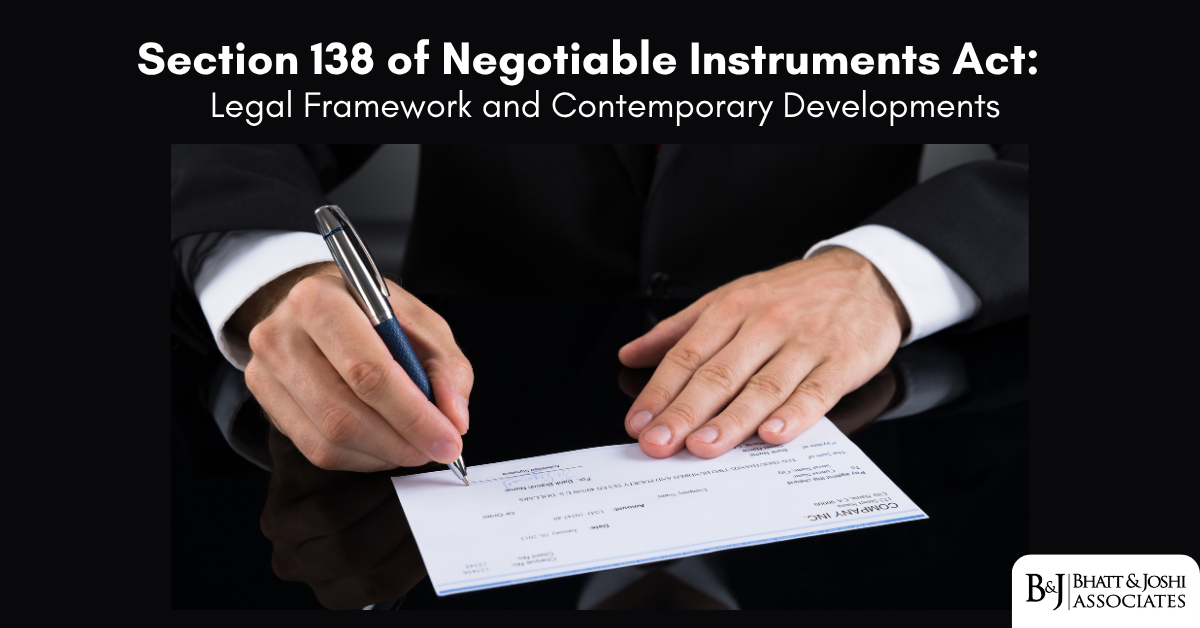Introduction
The Negotiable Instruments Act, 1881 stands as one of the cornerstone legislations governing commercial transactions in India. Within this comprehensive framework, Section 138 occupies a position of paramount importance, addressing the criminal liability arising from dishonour of cheques. This provision was introduced through Chapter XVII (Sections 138-142) with the specific objective of instilling confidence in banking operations and lending credibility to negotiable instruments employed in business transactions [1]. The genesis of Section 138 of Negotiable Instruments Act lies in the recognition that post-dated cheques serve as a crucial accommodation tool in business dealings. When a party issues a cheque as a mode of deferred payment, the payee accepts it on the faith that payment will be received on the due date. The legislative intent was clear: the payee should not suffer due to non-payment, and the drawer should not abuse the accommodation extended to them [2].
Legal Framework and Essential Elements
Statutory Provisions
Section 138 of the Negotiable Instruments Act, 1881 states: “Where any cheque drawn by a person on an account maintained by him with a banker for payment of any amount of money to another person from out of that account for the discharge, in whole or in part, of any debt or other liability, is returned by the bank unpaid, either because of the amount of money standing to the credit of that account is insufficient to honour the cheque or that it exceeds the amount arranged to be paid from that account by an agreement made with that bank, such person shall be deemed to have committed an offence and shall, without prejudice to any other provisions of this Act, be punished with imprisonment for a term which may extend to two years, or with fine which may extend to twice the amount of the cheque, or with both” [3].
Essential Ingredients for Section 138 Proceedings
The Supreme Court has consistently held that for establishing an offence under Section 138, certain fundamental ingredients must be satisfied. These elements, as crystallized through judicial pronouncements, include [4]:
First, a person must have drawn a cheque for payment of money to another person for the discharge of any debt or other liability. The term “debt or other liability” has been specifically defined in the explanation to Section 138 as meaning a legally enforceable debt or other liability.
Second, the cheque must have been presented to the bank within the prescribed period. Originally, this period was three months from the date of drawing, but subsequent amendments extended it to six months from the date on which it is drawn or within the period of its validity, whichever is earlier.
Third, the cheque must be returned by the bank unpaid due to insufficient funds or because it exceeds the amount arranged to be paid from that account by agreement with the bank. The dishonour must be for these specific reasons and not for technical reasons such as signature mismatch or post-dating.
Fourth, the payee must make a demand for payment by giving notice in writing to the drawer within fifteen days of receiving information from the bank regarding the return of the cheque as unpaid. This notice serves as a formal demand and provides the drawer an opportunity to make payment.
Fifth, the drawer must fail to make payment to the payee within fifteen days of receipt of the notice. Only upon expiry of this period does the cause of action arise, and the complainant can initiate criminal proceedings.
Procedural Framework
Notice Requirements and Jurisdictional Considerations
The procedural aspects of Section 138 cases have been subject to extensive judicial interpretation. The legal notice requirement serves as a crucial preliminary step before initiating criminal proceedings. The notice must contain specific details about the dishonoured cheque and demand payment within the stipulated timeframe [5].
The issue of jurisdiction was historically contentious, with multiple courts potentially having jurisdiction based on where different acts in the sequence occurred. To resolve this confusion, the Negotiable Instruments (Amendment) Act, 2015 introduced Section 142(2), which provides that offences shall be inquired into and tried by the court within whose local jurisdiction the bank branch of the payee is situated [6].
Trial Procedure and Summary Proceedings
Section 145 of the Act provides for evidence to be given by affidavit, subject to the court’s power to summon and examine the person giving the affidavit. This provision was introduced to expedite trials and reduce the burden on courts. The Supreme Court in M/s Meters and Instruments Private Limited v. Kanchan Mehta emphasized that proceedings under Section 138 should normally be conducted summarily, with discretion to hold regular trials only when sentences exceeding one year may be warranted [7].
Contemporary Legal Developments
The 2018 Amendment: Interim Compensation Provisions
The Negotiable Instruments (Amendment) Act, 2018 introduced two significant provisions: Section 143A and Section 148, both aimed at addressing the issue of prolonged litigation and providing interim relief to complainants [8].
Section 143A empowers courts trying offences under Section 138 to direct the drawer to pay interim compensation to the complainant. This compensation, which cannot exceed twenty percent of the cheque amount, may be ordered in summary trials or summons cases where the drawer pleads not guilty, or upon framing of charges in other cases. The interim compensation must be paid within sixty days from the date of the order, with the possibility of extension by an additional thirty days upon sufficient cause being shown [9].
Section 148 addresses appeals against conviction under Section 138. It empowers appellate courts to order the appellant to deposit a minimum of twenty percent of the fine or compensation awarded by the trial court. This amount is in addition to any interim compensation paid under Section 143A and must be deposited within sixty days of the appellate court’s order [10].
Retrospective Application and Judicial Interpretation
The question of retrospective application of these amendments has been definitively settled by the Supreme Court. In G.J. Raja vs. Tejraj Surana, the court held that Section 143A applies prospectively only to offences committed after its introduction. However, in Surinder Singh Deshwal vs. Virender Gandhi, the court ruled that Section 148 has retrospective effect and applies to all appeals pending on the date of its enforcement [11].
Alternative Dispute Resolution in Section 138 Cases
Mediation and Compounding
A significant development in Section 138 jurisprudence has been the increasing acceptance of alternative dispute resolution mechanisms. The Delhi High Court’s decision in Dayawati v. Yogesh Kumar Gosain established important precedents regarding the permissibility of referring Section 138 cases to mediation [12].
The court held that although the Code of Criminal Procedure does not contain express provisions enabling criminal courts to refer matters to alternate dispute resolution mechanisms, there is no legal bar to utilizing mediation, arbitration, or conciliation for settling disputes that are compoundable under Section 320 of the Code of Criminal Procedure. The court emphasized that proceedings under Section 138 are distinct from other criminal cases and are essentially civil wrongs given criminal overtones.
Judicial Approach to Compounding
The Supreme Court in Meters and Instruments Private Limited v. Kanchan Mehta provided crucial guidance on compounding of Section 138 offences. The court observed that while compounding traditionally requires consent of both parties, courts possess inherent powers to close proceedings in the interest of justice when the complainant has been adequately compensated and continuing proceedings would serve no meaningful punitive purpose [13].
Burden of Proof and Presumptions
Section 139 Presumption
Section 139 of the Act creates a rebuttable presumption in favour of the holder, stating that unless the contrary is proved, the holder of a cheque received it for the discharge of any debt or other liability. This presumption significantly shifts the evidential burden to the accused, who must establish by preponderance of probabilities that no legally enforceable debt existed [14].
The Supreme Court has consistently held that the standard of proof required to rebut this presumption is “preponderance of probabilities” rather than proof beyond reasonable doubt. Once the accused adduces evidence to rebut the presumption and it is accepted by the court, the evidential burden shifts back to the complainant.
Mens Rea and Strict Liability
Unlike most criminal offences, Section 138 does not require proof of mens rea. Section 140 specifically provides that it shall not be a valid defence that the drawer had no reason to believe when issuing the cheque that it would be dishonoured. This creates a regime of strict liability, making the offence one of absolute liability concerning the act of issuing a cheque that subsequently gets dishonoured for insufficient funds [15].
Contemporary Challenges and Judicial Responses
Mounting Pendency and Systemic Issues
The Law Commission of India’s 213th Report highlighted that approximately 20% of the total case pendency in Indian courts relates to Section 138 proceedings. This staggering statistic underscores the systemic challenges posed by the volume of cheque bounce cases and the need for innovative solutions to expedite their disposal.
Recent Supreme Court Guidelines
Recent Supreme Court decisions have emphasized the compensatory nature of Section 138 proceedings while acknowledging their punitive aspects. The court has encouraged summary trials and has provided flexibility in determining appropriate compensation mechanisms. In particular, the court has stressed that the primary objective should be ensuring that complainants receive adequate compensation rather than focusing solely on punishment [16].
Recommendations for Systemic Improvements
Infrastructure and Administrative Reforms
Contemporary legal analysis suggests several areas for improvement in the Section 138 framework. These include increasing the number of magistrates exclusively designated for cheque bounce cases, implementing time-bound hearings with fixed schedules, and eliminating court fees for victims of cheque dishonour who are not making fresh monetary claims.
Procedural Innovations
The adoption of a structured four-hearing procedure has been recommended, whereby non-appearance at the first hearing would result in issuance of a non-bailable warrant, the second hearing would require the accused to show cause and file defence, the third would conduct cross-examination, and the fourth would conclude with arguments and judgment.
Technological Integration
The integration of technology in case management, electronic service of notices, and digital evidence presentation could significantly reduce the time required for disposal of Section 138 cases while maintaining due process protections.
Future Directions and Legal Evolution
Balancing Deterrent and Compensatory Objectives
The evolution of Section 138 jurisprudence reflects a continuous effort to balance the deterrent effect necessary to maintain confidence in negotiable instruments with the compensatory needs of victims of cheque dishonour. Recent amendments and judicial pronouncements indicate a shift towards prioritizing swift compensation while retaining sufficient deterrent effect.
Integration with Digital Payment Systems
As India moves towards a more digital economy, the relevance and application of Section 138 may need to evolve to address dishonour of digital payment instruments and electronic fund transfers. The legal framework may require updates to encompass these emerging forms of payment mechanisms while maintaining the fundamental protections afforded to creditors.
Conclusion
Section 138 of the Negotiable Instruments Act represents a critical component of India’s commercial law framework, providing essential protections for creditors while seeking to maintain confidence in the banking system and negotiable instruments. The provision has evolved significantly through amendments and judicial interpretation, with recent developments focusing on expediting proceedings and ensuring adequate compensation for victims.
The introduction of interim compensation provisions, acceptance of alternative dispute resolution mechanisms, and emphasis on summary proceedings reflect a maturing understanding of the provision’s primary compensatory purpose. However, challenges remain in terms of case pendency and the need for continued procedural reforms.
The success of Section 138 in achieving its objectives depends not only on the legal framework but also on effective implementation, adequate judicial infrastructure, and continued evolution to meet the needs of India’s growing economy. As commercial practices continue to evolve, particularly with the increasing digitization of payments, the legal framework governing dishonour of payment instruments must adapt while maintaining the fundamental protections that have made Section 138 an essential tool for commercial confidence.
The provision serves as an excellent example of how legal frameworks can evolve through judicial interpretation and legislative amendment to better serve their intended purposes while addressing practical challenges in implementation. The ongoing refinements to Section 138 demonstrate the law’s capacity to adapt to changing commercial realities while maintaining its core protective functions.
References
[1] Kumar, A. (2019). Evolution of Negotiable Instruments Law in India. Eastern Law House. Available at: https://www.mondaq.com/india/financial-services/812822/section-138-of-negotiable-instruments-act-overview
[2] Legal Service India. (2020). Critical Analysis of Section-138 of Negotiable Instruments Act. Available at: https://www.legalserviceindia.com/legal/article-1558-critical-analysis-of-section-138-of-negotiable-instruments-act.html
[3] India Code. (2025). The Negotiable Instruments Act, 1881 – Section 138. Available at: https://www.indiacode.nic.in/show-data?actid=AC_CEN_2_33_00042_00042_1523271998701§ionId=45718§ionno=138&orderno=143
[4] Drishti Judiciary. (2024). Examination of Basic Ingredients of Section 138 of NIA. Available at: https://www.drishtijudiciary.com/current-affairs/examination-of-basic-ingredients-of-section-138-of-nia
[5] iPleaders. (2024). Section 138 of Negotiable Instruments Act, 1881. Available at: https://blog.ipleaders.in/section-138-of-negotiable-instruments-act-1881/
[6] Amendment Act. (2015). Negotiable Instruments (Amendment) Act, 2015. Government of India.
[7] Supreme Court of India. (2017). M/s Meters and Instruments Private Limited & Anr. v. Kanchan Mehta. (2018) 1 SCC 560. Available at: https://indiankanoon.org/doc/160848531/
[8] Lexology. (2020). The Negotiable Instrument (Amendment) Act, 2018 – an Overview. Available at: https://www.lexology.com/library/detail.aspx?g=070d1241-a9ed-4dc1-8deb-27bbf81dea99
[9] Vidhikarya. (2022). Section 143A of Negotiable Instruments Act: Power of the Court to Direct Interim Compensation. Available at: https://www.vidhikarya.com/legal-blog/section-143a-of-negotiable-instruments-act-power-of-the-court-to-direct-interim-compensation
[10] India Law Offices. (2024). Recent Amendments in Negotiable Instruments Act 2018. Available at: https://www.indialawoffices.com/legal-articles/recent-amendments-in-negotiable-instruments-act
[11] Ibid
[12] Delhi High Court. (2017). Dayawati vs. Yogesh Kumar Gosain. CRL.REF.No.1/2016. Available at: https://indiankanoon.org/doc/171370472/
[13] LawBhoomi. (2024). Meters and Instruments Pvt Ltd & Anr vs Kanchan Mehta. Available at: https://lawbhoomi.com/meters-and-instruments-pvt-ltd-anr-vs-kanchan-mehta/
[14] Mondaq. (2019). Negotiable Instruments (Amendment) Act, 2018 – Retrospective Or Not? Available at: https://www.mondaq.com/india/trials-amp-appeals-amp-compensation/814178/negotiable-instruments-amendment-act-2018–retrospective-or-not-
[15] iPleaders. (2020). Landmark judgments on section 138 of the Negotiable Instruments Act. Available at: https://blog.ipleaders.in/landmark-judgments-section-138-negotiable-instruments-act/
[16] Criminal Law Review. (2018). M/S. METERS & INSTRUMENTS PVT. LTD. v. KANCHAN MEHTA. Available at: https://crlreview.wordpress.com/2018/02/09/m-s-meters-instruments-pvt-ltd-v-kanchan-mehta-weekly-read/
Download Full Judgement
- https://bhattandjoshiassociates.s3.ap-south-1.amazonaws.com/judgements/negotiable_instruments_act,_1881 (2).pdf
- https://bhattandjoshiassociates.s3.ap-south-1.amazonaws.com/judgements/M_S_Meters_And_Instruments_Private_vs_Kanchan_Mehta_on_5_October_2017.PDF
- https://bhattandjoshiassociates.s3.ap-south-1.amazonaws.com/judgements/Dayawati_vs_Yogesh_Kumar_Gosain_on_17_October_2017.PDF












